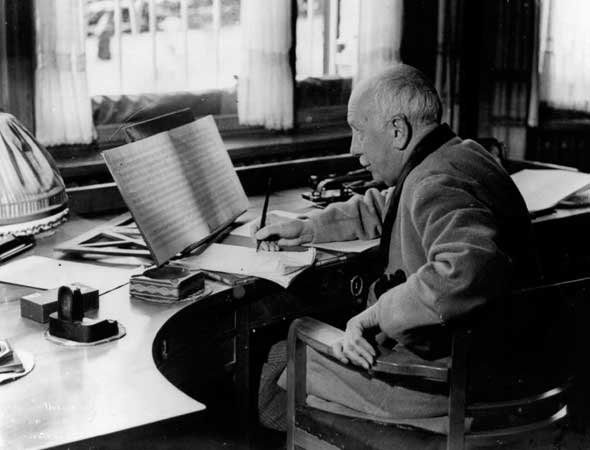R. STRAUSS: Till Eulenspiegel’s Merry Pranks
by Jeff Counts
THE COMPOSER – RICHARD STRAUSS (1864-1949) – Strauss was in rehearsals for his first opera Guntram when he got official word of his appointment as Kappellmeister in Munich, a city to which he was happy to return. This was 1894 and though Guntram would not be a success, Strauss’ conducting star was rising steadily with productions of Tristan, Meistersinger, Rienzi, Tännhauser, Zauberflöte and other important works to his credit within a year of his arrival at the Bavarian State Opera. Somehow, even with that staggering list of musical responsibilities, Strauss was also beginning to make a name for himself as an orchestral composer. This was thanks especially to his tone poems which, after a few early efforts in the 1880s, began to display even more sophistication and instrumental color.

THE HISTORY – 1894 included another, even more important event for Strauss. He married Pauline de Ahna that September and their fascinating bond would last until his death nearly forty-five years later. The first professional proof of Strauss’ marital bliss was Till Eulenspeigels lustige Streiche. He originally considered the tale of the mediaeval troublemaker Till Eulenspiegel to be worthy of full operatic treatment. But whether he was still smarting over the failure of Guntram or just simply thought better of it, he eventually struck just the right balance in 1895 with the concentrated energy and concision of the tone poem form. Strauss’ moment in the operatic sun would come soon enough (Salome, 1905), but the last half of the 1890s was devoted to the possibilities of orchestral color and narrative potency. Speaking of colorful stories, the character of Till dates back (at least) to the 15th century in tales of roguish misadventure and trickery. His legend plays largely upon the common man’s belief that avarice can be found behind every pillar in the halls of the entitled and that it is the gift of the good-hearted, witty fool to expose them. The Strauss version of Till’s exploits opens expectantly, like the first page of a child’s board book. Once the stage is properly set and the hero is identified, the listener follows Till’s path of social destruction as he frustrates workmen, pastors and intellectuals alike. His efforts earn him an appearance before the town’s judges and they, upon reviewing his life’s work to date, find him worthy of nothing less than death. Till, perfectly in character to the very end, gets off one last mocking phrase before the execution cuts him dramatically short. With this nasty bit of business done, Strauss uses the last page of the story book to recall the first while also assuring any remaining doubters that Till, regardless of what we have just witnessed, lives on.
THE WORLD – Elsewhere in 1895, Cuba began an attempt to throw off Spanish rule, the First Sino-Japanese War ended, H.G. Wells published The Time Machine and Oscar Wilde staged The Importance of Being Earnest.
THE CONNECTION – Till Eulenspiegel’s Merry Pranks is one of the most popular of Strauss’ tone poems for the Utah Symphony. It was last performed in September 2017 with Thierry Fischer conducting.











